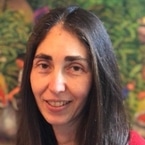
Abstract 385. iRGD mediated delivery of neoantigens to enable immunotherapy in integrin b5-rich tumors.
What are your long-term career objectives?
I am a biologist with a long-standing interest in cancer biology. I am determined to pursue an independent career in translational cancer research, specifically in targeted cancer immunotherapy. Current non-targeted treatments using cytotoxic drugs can be very harmful to healthy tissue and I believe that in the future, cancer therapy should rely on targeted approaches. One example is the iRGD targeting system we have been working on for the past 10 years. iRGD is a tumor-penetrating peptide that has the ability to deliver linked or co-administered drugs specifically to tumors. This results in reduced toxicity to healthy tissue and increased drug penetration into the tumor, two factors that increase therapeutic efficacy. In the past decade, basic and translational work has shown that immunotherapy can be a powerful weapon against certain types of cancer, but it has had very limited success in solid tumors like pancreatic or breast cancer, in part due to their lower amount of neoantigens. I intend to use my experience in iRGD mediated tumor targeting to introduce neoantigens in these solid tumors in order to render them suitable targets for immunotherapies. My vision for translation of these approaches is to redirect the patient’s pre-existing immunity against a pathogen toward the tumor.
Please share information about how the COVID-19 pandemic has impacted your research over the last two years.
The COVID-19 pandemic has brought many challenges but at the same time, it has given us the opportunity to spend more time with our families and has trained us to optimize our time to the maximum. As parents of three little kids, my husband and I have had to find a way to take turns looking after the kids and working at the same time. At the beginning of the pandemic labs shut down and we could not do experimental work, It was, however, an opportunity to focus on grant writing and ideas. I also wanted to contribute to fighting the pandemic and even if it is not my field of expertise I really wanted to understand why some people were completely asymptomatic while others got severely ill. When it became known that Infection by SARS-CoV-2 requires its interaction with cellular angiotensin-converting enzyme 2 receptor (ACE2) and Heparan Sulphate (HS), I hypothesized that our saliva may contain soluble ACE2 and/or HS that would antagonize viral infection and that the level of these soluble forms could determine susceptibility to COVID-19. High level of ACE2 and/or HS in saliva could reduce the load of viral infection in the upper respiratory tract and prevent its spread to the lower respiratory tract. I set out to test this hypothesis by organizing a team of experts and initiated raising funds. The team includes Dr. Jeffrey Esko (professor in glycobiology, cellular and molecular medicine), Dr. Sanjay Mehta (professor of medicine, infectious diseases), and Dr. Mark Fuster (professor of medicine, pulmonology, and critical care) at UCSD. After obtaining the ethical approvals and the required permissions we secured funding for a pilot study with crowdfunding and with a grant from the UCSD Academic Senate and initiated sample collections. At present we have collected saliva samples from 90 subjects from different age groups (7 to 90 years old) that will be processed and analyzed to determine whether there is a correlation between the levels of sACE2 and sHS with age, gender, and COVID-19 history.